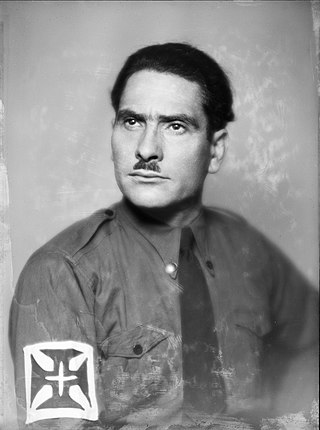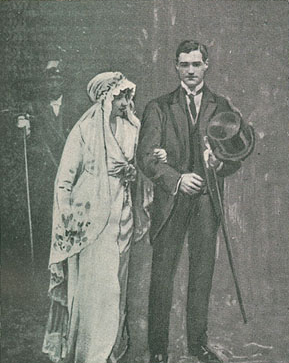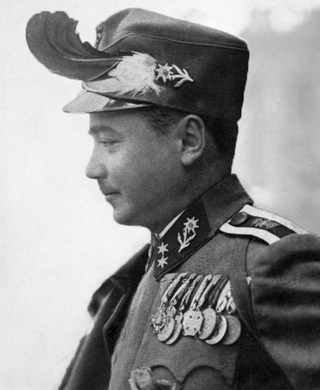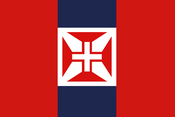
The Falange Española de las Juntas de Ofensiva Nacional Sindicalista was a fascist political party founded in Spain in 1934 as merger of the Falange Española and the Juntas de Ofensiva Nacional-Sindicalista. FE de las JONS, which became the main fascist group during the Second Spanish Republic, ceased to exist as such when, during the Civil War, General Francisco Franco merged it with the Traditionalist Communion in April 1937 to form the similarly named Falange Española Tradicionalista y de las JONS.

The National Union was the sole legal party of the Estado Novo regime in Portugal, founded in July 1930 and dominated by António de Oliveira Salazar during most of its existence.

Francisco de Barcelos Rolão Preto, GCIH was a Portuguese politician, journalist, and leader of the Portuguese National Syndicalists Movement (MNS), a fascist organization. When in 1934 Salazar decided to ban the National Syndicalist Movement, Preto was briefly detained and later exiled. While in exiled and in Madrid, he was a guest in the house of José Antonio Primo de Rivera, with whom he collaborated in formulating a program for the Falange. In the eve of the Second World War he published a new editions of his work on Italian Fascism with high hopes on the Berlin-Rome axis. After World War II, Rolão Preto abandoned fascism and joined the left-wing forum Movement of Democratic Unity In 1949 he participated in General Norton de Matos’s 1949 presidential election campaign. He also backed more liberal candidates for the Presidency, such as Quintão Meireles, Francisco Higino Craveiro Lopes, and, ultimately, had a particularly important role in the 1958 campaign of another Salazar's opponent, General Humberto Delgado.

Falangism was the political ideology of two political parties in Spain that were known as the Falange, namely first the Falange Española de las Juntas de Ofensiva Nacional Sindicalista and afterwards the Falange Española Tradicionalista y de las Juntas de Ofensiva Nacional Sindicalista. Falangism has a disputed relationship with fascism as some historians consider the Falange to be a fascist movement based on its fascist leanings during the early years, while others focus on its transformation into an authoritarian conservative political movement in Francoist Spain.

Ramiro Ledesma Ramos was a Spanish philosopher, politician, writer, essayist, and journalist, known as one of the pioneers in the introduction of Fascism in Spain.
Integralismo Lusitano was a Portuguese integralist political movement founded in Coimbra in 1914 that advocated traditionalism but not conservatism. It was against parliamentarism but favoured decentralization, national syndicalism, the Catholic Church and the monarchy. Its members included an amalgam of rightists, monarchists, Catholics and nationalists.

The Falange Española Tradicionalista y de las Juntas de Ofensiva Nacional Sindicalista, frequently shortened to just "FET", was the sole legal party of the Francoist regime in Spain. It was created by General Francisco Franco in 1937 as a merger of the fascist Falange Española de las JONS with the monarchist neo-absolutist and integralist Catholic Traditionalist Communion belonging to the Carlist movement. In addition to the resemblance of names, the party formally retained most of the platform of FE de las JONS and a similar inner structure. In force until April 1977, it was rebranded as the Movimiento Nacional in 1958.
Falangism in Latin America has been a feature of political life since the 1930s as movements looked to the national syndicalist clerical fascism of the Spanish state and sought to apply it to other Spanish-speaking countries. From the mid-1930s, the Falange Exterior, effectively an overseas version of the Spanish Falange, was active throughout Latin America in order to drum up support among Hispanic communities. However, the ideas would soon permeate into indigenous political groups. The term "Falangism" should not be applied to the military dictatorships of such figures as Alfredo Stroessner, Augusto Pinochet and Rafael Trujillo because while these individuals often enjoyed close relations to Francisco Franco's Spain, their military nature and frequent lack of commitment to national syndicalism and the corporate state mean that they should not be classed as Falangist. The phenomenon can be seen in a number of movements both past and present.

Fascist movements in Europe were the set of various fascist ideologies which were practiced by governments and political organizations in Europe during the 20th century. Fascism was born in Italy following World War I, and other fascist movements, influenced by Italian Fascism, subsequently emerged across Europe. Among the political doctrines which are identified as ideological origins of fascism in Europe are the combining of a traditional national unity and revolutionary anti-democratic rhetoric which was espoused by the integral nationalist Charles Maurras and the revolutionary syndicalist Georges Sorel.
The 1934 Montreux Fascist conference, also known as the Fascist International Congress, was a meeting held by deputies from a number of European Fascist organizations. The conference was held on 16–17 December 1934 in Montreux, Switzerland. The conference was organised and chaired by the Comitati d'Azione per l'Universalità di Roma.
Fascism in South America encompasses an assortment of political parties and movements modeled on fascism. Although the ideology originated in and is primarily associated with Europe, fascism crossed the Atlantic Ocean in the interwar period and had an influence on South American politics. Italian fascism had a deep impact in the region, both directly and indirectly.
Alberto de Morés Monsaraz was a Portuguese politician and poet. He was one of the central figures in the Integralismo Lusitano that dominated the far-right of Portuguese politics during the early years of the twentieth century.

José Hipólito Raposo was a Portuguese politician, writer, lawyer and historian born in São Vicente da Beira.

António de Eça de Queiroz or Queirós was a Portuguese monarchist politician and agitator and an official in the Estado Novo of António de Oliveira Salazar. He was married to Maria Cristina Guimarães Rino, without issue.

António de Oliveira Salazar was a Portuguese statesman, academic, and economist who served as Prime Minister of Portugal from 1932 to 1968. Having come to power under the Ditadura Nacional, he reframed the regime as the corporatist Estado Novo, with himself as a dictator. The regime he created lasted until 1974, making it one of the longest-lived authoritarian regimes in Europe.

The Nationalist faction was a major faction in the Spanish Civil War of 1936 to 1939. It was composed of a variety of right-leaning political groups that supported the Spanish Coup of July 1936 against the Second Spanish Republic and Republican faction and sought to depose Manuel Azaña, including the Falange, the CEDA, and two rival monarchist claimants: the Alfonsist Renovación Española and the Carlist Traditionalist Communion. In 1937, all the groups were merged into the FET y de las JONS. After the death of the faction's early leaders, General Francisco Franco, one of the members of the 1936 coup, headed the Nationalists throughout most of the war, and emerged as the dictator of Spain until his death in 1975.

National syndicalism is a far-right adaptation of syndicalism to suit the broader agenda of integral nationalism. National syndicalism developed in France in the early 20th century, and then spread to Italy, Spain, and Portugal.
Fascist syndicalism was an Italian trade syndicate movement that rose out of the pre-World War II provenance of the revolutionary syndicalist movement led mostly by Edmondo Rossoni, Sergio Panunzio, Angelo Oliviero Olivetti, Michele Bianchi, Alceste De Ambris, Paolo Orano, Massimo Rocca, and Guido Pighetti, under the influence of Georges Sorel, who was considered the "'metaphysician' of syndicalism". The fascist syndicalists differed from other forms of fascism in that they generally favored class struggle, worker-controlled factories and hostility to industrialists, which lead historians to portray them as "leftist fascist idealists" who "differed radically from right fascists." Generally considered one of the more radical fascist syndicalists in Italy, Rossoni was the "leading exponent of fascist syndicalism", and sought to infuse nationalism with "class struggle".

Para-fascism refers to authoritarian conservative movements and regimes that adopt characteristics associated with fascism such as personality cults, paramilitary organizations, symbols and rhetoric, but it diverges from conventional fascist tenets such as palingenetic ultranationalism, modernism, and populism. It often emerges in response to the need for a facade of popular support in an age of mass politics, without a genuine commitment to revolutionary nationalism, instead focusing on maintaining tradition, religion, and culture. Para-fascist regimes may co-opt or neutralize genuine fascist movements. Examples of para-fascism include the regimes and movements of Austrofascism in Austria, Metaxism in Greece, the “New State” of Salazars’ Portugal, and Francoism in Spain.












